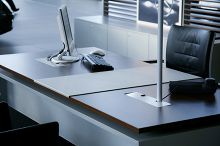You do not need an empty desk
Datum: 2012-05-30 12:00

I speak of the benefits of starting your day with en empty desk almost daily.
And though it is a good start, it is easy to be misguided by this concept into believing that the desk must remain empty throughout the day in order for us to score any structure-brownie-points (if such a thing were to exist), but this is neither a practical nor optimal way of thinking.
The purpose of starting fresh in the morning with an empty desk is of course to have as few distracting elements surrounding us as possible which might hinder us from working with what is most important today.
We probably need to use a great deal of space to solve the more difficult tasks we are faced with throughout the day, and hence need to keep the permanent piles on the desk to a bare minimum.
Less elements of distraction, such as papers, things or documents that catch our attention when we really need to remain focused on something else, reduces the risk of loosing focus and concentration.
Rather than keeping your desk pedantically cleared of any clutter at all times, try striving for making it easy to clear off. And this goes both for your physical desk as well as your computer desktop.
Here are eight tips on how to make your desktops easy to empty.
Do this
- Keep your files concerning ongoing projects in a cabinet for hanging file folders rather than stacked in a pile. The cabinet or stand is easy to move when you need more space.
- Have a physical inbox that is easy to move aside rather than keeping a pile (or piles) of notes what you and others have at some point put on your desk.
- Keep the system or storage-space you have for storing documents close at hand so that no new piles are formed while the documents are waiting for you to file them correctly into place.
- Keep as many documents as possible in a digital format, and keep a scanner a foot or two away from your seat in order to make this process of digitalization easier.
Once you have scanned it, throw away the physical document, or store it someplace other than on your desk. Store the scanned document in your folder-structure on your hard-drive. - Keep your to-do-list on the computer, for instance in Outlook, Omnifocus or in some other online service, rather than writing PostIt-notes and pasting them on your screen or keyboard.
- Do not save any documents on your computer desktop that you cannot erase at the end of the day.
Store them in the folder-structure on your hard-drive instead, and use a file-finder-feature such as Launchy, Spotlight or Quicksilver. - If you still want piles of paper easily available, make your piles on trays with handles. You can then easily remove the trays when you do not wish to see the piles.
- If you have a bulletin board above your desk, purchase a piece of fabric to drape over and cover it completely when you need to engage in something with undivided attention and focus.
Fasten a screw hook on either side of the board to hang the fabric on.
Less distracted
If you can empty your desk or your entire workspace effortlessly, it will be much easier to focus on the tasks that really require your undivided attention.
You will not have to evacuate yourself to an empty space, such as a conference room, when you need to solve a complicated problem, since you are completely free of distractions when you are in your regular workspace.
Prepare yourself for getting taunted or teased by colleagues who haven’t been as successful in clearing their workspaces. Yet.
What is your way?
How do you get plenty of space to work in when you want to develop a great idea? Let me know by leaving a comment.




